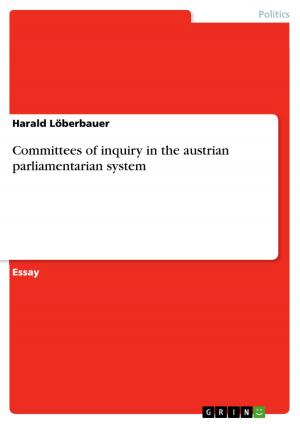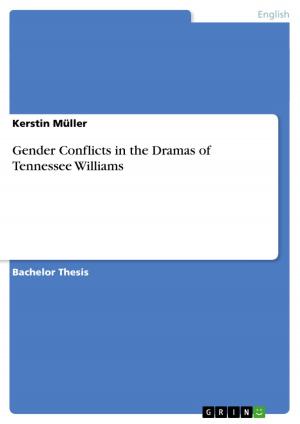The Great War and its effects in D. H. Lawrence's Lady Chatterley's Lover
Fiction & Literature, Literary Theory & Criticism, British| Author: | Daniela Wack | ISBN: | 9783638540667 |
| Publisher: | GRIN Publishing | Publication: | September 2, 2006 |
| Imprint: | GRIN Publishing | Language: | English |
| Author: | Daniela Wack |
| ISBN: | 9783638540667 |
| Publisher: | GRIN Publishing |
| Publication: | September 2, 2006 |
| Imprint: | GRIN Publishing |
| Language: | English |
Seminar paper from the year 2004 in the subject English Language and Literature Studies - Literature, grade: 2,0, University of Freiburg, 16 entries in the bibliography, language: English, abstract: A lot of British literature from the 1920's reflects on the life of post-World War I England and the experiences of the war. Using the words of Samuel Heynes in A War Imagined,'war writing and Modernist writing interpenetrated each other' (Heynes 1990: 458). Aldous Huxley, for example, illustrates satirically the fragile post-war English intellectual life in his works Crome Yellow and Mortal Coils.In Mrs. Dalloway and To the Lighthouse, Virginia Wolf portrays the war with a female voice. Also, T. S. Eliot's early poetry is preoccupied with post-war society. He saw the Jazz Age after the war as a breakdown of civilisation and its values (cf. Brockhampton Dictionary of Literature 1995: 72, 110, 246). Also in D. H. Lawrence's writings the aftermath of the war plays an important role. Lawrence concentrated on the psychological and social effects of the war and drew from own experiences for his writing.Lady Chatterley's Lover demonstrates how the war changed English society and the individual. Lawrence, who was a strong opponent of the war, describes the negative effects of it. He combines all the themes that Huxley, Woolf, and Eliot present in their writings, mocking intellectualism and the collapse of civilisation, and describing female suffering and fulfilment. However, he leaves the reader with a hope note, ending his novel with the fulfilling relationship between the protagonists Connie and Mellors. Although the words are 'Ours is essentially a tragic age', Lady Chatterley's Lover ends with a promising letter of Mellors in which he looks into the future 'with a hopeful heart' (LCL 314). This emotional journey from a shattered society to a life-affirming one is the main idea of the book. 'It proposes the possibility of vital connections between men and women, the need for a radical change in consciousness, the self-affirmation and triumph of life in opposition to the destructive and sterilizing forces of the modern world' (Meyers 1990: 357). Taking this idea of a renewed society as a starting point, this paper examines the effects of the war in the novel and analyses the significance of and injury and trauma, elaborates on the role of intellectualism and industrialism in post-war England, and considers the importance of love and sexuality. Before analysing the novel itself from this point of view, a historical context is given, in which the effects of the Great War on English society are described. [...]
Seminar paper from the year 2004 in the subject English Language and Literature Studies - Literature, grade: 2,0, University of Freiburg, 16 entries in the bibliography, language: English, abstract: A lot of British literature from the 1920's reflects on the life of post-World War I England and the experiences of the war. Using the words of Samuel Heynes in A War Imagined,'war writing and Modernist writing interpenetrated each other' (Heynes 1990: 458). Aldous Huxley, for example, illustrates satirically the fragile post-war English intellectual life in his works Crome Yellow and Mortal Coils.In Mrs. Dalloway and To the Lighthouse, Virginia Wolf portrays the war with a female voice. Also, T. S. Eliot's early poetry is preoccupied with post-war society. He saw the Jazz Age after the war as a breakdown of civilisation and its values (cf. Brockhampton Dictionary of Literature 1995: 72, 110, 246). Also in D. H. Lawrence's writings the aftermath of the war plays an important role. Lawrence concentrated on the psychological and social effects of the war and drew from own experiences for his writing.Lady Chatterley's Lover demonstrates how the war changed English society and the individual. Lawrence, who was a strong opponent of the war, describes the negative effects of it. He combines all the themes that Huxley, Woolf, and Eliot present in their writings, mocking intellectualism and the collapse of civilisation, and describing female suffering and fulfilment. However, he leaves the reader with a hope note, ending his novel with the fulfilling relationship between the protagonists Connie and Mellors. Although the words are 'Ours is essentially a tragic age', Lady Chatterley's Lover ends with a promising letter of Mellors in which he looks into the future 'with a hopeful heart' (LCL 314). This emotional journey from a shattered society to a life-affirming one is the main idea of the book. 'It proposes the possibility of vital connections between men and women, the need for a radical change in consciousness, the self-affirmation and triumph of life in opposition to the destructive and sterilizing forces of the modern world' (Meyers 1990: 357). Taking this idea of a renewed society as a starting point, this paper examines the effects of the war in the novel and analyses the significance of and injury and trauma, elaborates on the role of intellectualism and industrialism in post-war England, and considers the importance of love and sexuality. Before analysing the novel itself from this point of view, a historical context is given, in which the effects of the Great War on English society are described. [...]















